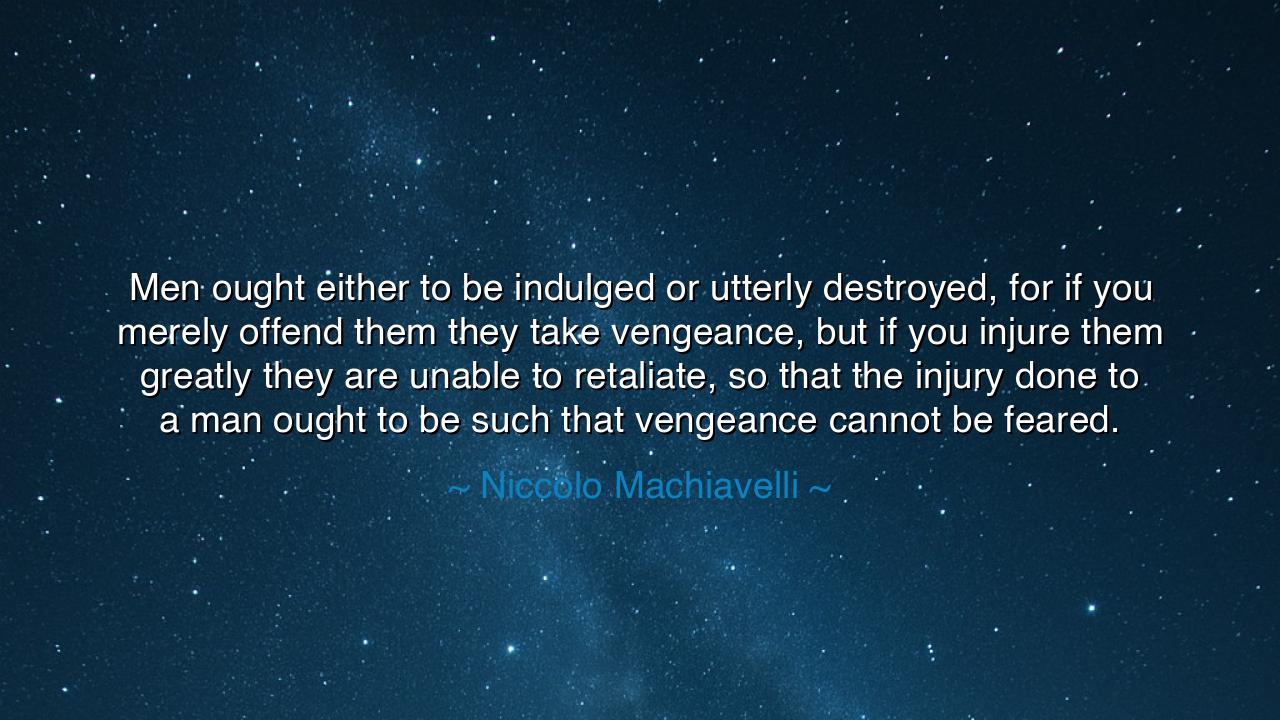
Men ought either to be indulged or utterly destroyed, for if you
Men ought either to be indulged or utterly destroyed, for if you merely offend them they take vengeance, but if you injure them greatly they are unable to retaliate, so that the injury done to a man ought to be such that vengeance cannot be feared.






Hear the dark and incisive wisdom of Niccolò Machiavelli, whose words ring with the cold logic of power: "Men ought either to be indulged or utterly destroyed, for if you merely offend them they take vengeance, but if you injure them greatly they are unable to retaliate, so that the injury done to a man ought to be such that vengeance cannot be feared." In these words, Machiavelli lays bare the brutal nature of human relationships—a relationship shaped by power, pride, and the instinct for revenge. He speaks to a truth known throughout history: when dealing with those who hold power, there is no middle ground. To offend them is to invite retaliation; to harm them greatly is to rob them of the ability to strike back. In Machiavelli’s view, the balance of power is won by striking in such a way that your enemy is rendered powerless, unable to exact the same cruelty upon you in return.
The ancients understood the ferocity of revenge and the importance of strategic dominance. The Greeks spoke of Homeric honor, a system of values that demanded retribution for insults or injuries. In The Iliad, the Trojan War is fueled by countless acts of vengeance, where even slight offenses lead to devastating consequences. The heroes of that time, from Achilles to Hector, were bound by the laws of honor, which demanded retribution for any harm done, no matter how small. In this world, to offend was to risk war; yet, Machiavelli takes this concept further by suggesting that power should be held in a way that is not just dominant, but absolutely unassailable. By striking so decisively that no revenge can be taken, you eliminate any threat to your rule.
Consider the example of Julius Caesar, whose rise to power and eventual betrayal by his close friends and allies exemplifies Machiavelli’s teachings. Caesar was indulged by the people and his soldiers, yet his ambition drove him to take power for himself in a manner that left his enemies both weakened and unable to respond. His assassination, however, was the ultimate retaliation—a direct injury to Caesar so severe that he could not defend himself, but the consequences of his death were far-reaching. The Roman Republic crumbled in the wake of Caesar's destruction, as the very act of eliminating him ignited a series of civil wars. Machiavelli's advice in this context may seem to validate the idea that destroying an adversary is a way to ensure one’s dominance, yet the eventual destruction of Caesar’s enemies also serves as a warning—his death, while rendering him unable to retaliate, did not secure peace, but instead led to a greater conflict.
In Machiavelli’s world, power must be secured through absolute dominance. The concept of indulgence and destruction is not simply about revenge, but about the manipulation of perception and control. To allow your enemy to live with a sense of hope or strength after being injured is to leave a threat open. In his The Prince, Machiavelli advises rulers to govern with fear rather than love, recognizing that men are fickle and that love can be easily lost, but fear, when properly cultivated, ensures a lasting reign. It is not merely about the punishment of the disloyal, but about eliminating the possibility of their future vengeance.
This brutal philosophy of power teaches a harsh lesson about the nature of authority. A ruler or leader must understand that those who are offended by their decisions or actions can and will seek vengeance. Yet, the ultimate power lies not in the acts of retaliation, but in the ability to cripple the enemy so thoroughly that they can never strike back. This is a cold, calculated reality of leadership—you must wield your power with such finality that no one can ever rise against you, not even in their deepest rage. The power of the ancients, from the kings of Egypt to the emperors of Rome, was built on this principle, where loyalty was maintained by the fear of destruction, rather than the hope of mutual respect.
Machiavelli’s teaching is, at its core, a lesson in power dynamics. It is a reminder that in the struggle for control, it is not enough to simply offend or threaten an enemy—you must either undermine their power completely or make them fear your retribution to such an extent that they will never act against you. In modern times, we see echoes of this in the strategies of leaders who understand the importance of absolute dominance, whether in politics, business, or warfare. Yet, we must also question the long-term effects of such an approach, for the cycle of revenge is endless, and total dominance can lead to instability and chaos, as history itself has shown.
Therefore, I urge you, dear listener, to reflect on the balance of power in your own life. Machiavelli’s philosophy may speak to the nature of leadership, but it also serves as a warning about the destructive forces of unchecked revenge and the dangers of overextending one’s dominance. There is a fine line between securing your position and creating a world in which vengeance will forever haunt you. Strive to cultivate wisdom in your actions, understanding that true strength comes not from the fear of retaliation, but from the ability to lead with justice, compassion, and an awareness of the long-term consequences of your decisions. Only then can you rise above the cycle of vengeance and create a legacy of true power.






AAdministratorAdministrator
Welcome, honored guests. Please leave a comment, we will respond soon